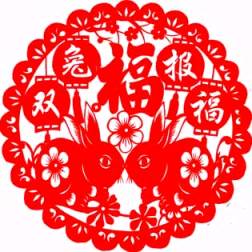The filial piety of Emperor Shun (23rd to 22nd century BC) was mentioned by Mencius when he said:
'Suppose the case of the whole kingdom turning in great delight to an individual to submit to him. To regard the whole kingdom thus turning to him in great delight but as a bundle of grass - only Shun was capable of this. He considered that if one could not get the hearts of his parents he could not be considered a man, and that if he could not get to an entire accord with his parents, he could not be considered a son. By Shun's completely fulfilling everything by which a parent could be served, Gushou (his father, literally means Blind Old-Man) was brought to find delight in what was good. When Gushou was brought to find that delight, the whole kingdom was transformed. When Gu Sou was brought to find that delight, all fathers and sons in the kingdom were established in their respective duties. This is called great filial piety.'
The story of Shun’s filial piety was later included as the first story in the book entitled The Twenty-four Paragons of Filial Piety written by the Yuan Dynasty scholar Guo Jujing.
In ancient China, during the reign of Yu, there lived a young man named Shun who was the son of Gushou. His nature was most filial. But his father was obstinate and his mother was boorish. His younger brother Xiang was proud and overbearing.
His families treated him very ill, and his mother and brother even had tried to murder him for several times. But every time after he saved himself with his wits, he forgave them. When he realized that his families hated him so much that they could not stop brewing plot against him, he run away and farm on Mount Li (in today's Shandong province)
When he worked in the field, the elephants ploughed for him and the birds weeded for him, for his feelings of filial piety were so great (that even the beasts were moved). Emperor Yao (of Tang) heard of this; he sent nine of his sons to wait on him and two of his daughters to be his wives and later abdicated the throne in his favour.
Verses praise him saying:
Herds of elephants plough in the spring;
Flocks of birds pull the weeds;
He is the heir of Yao and mounts his throne;
The spirit of filial piety moves the heart of Heaven.
.
.
孟子谈到‘孝’时提到了帝舜(公元前23至22世纪之间):
‘天下大悦而将归己。视天下悦而归己,犹草芥也。惟舜为然。不得乎亲,不可以为 人;不顺乎亲,不可以为子。言舜视天下之归己如草芥,而惟欲得其亲而顺之也。得者。曲为承顺以得其心之悦而已。顺则有以谕之于道,心与之一而未始有违,尤人所难也。为人盖泛言之,为子则愈密矣。舜尽事亲之道而瞽瞍厎豫,瞽瞍厎豫而天下化,瞽瞍厎豫而天下之为父子者定,此之谓 大孝。’
后来元代学者郭居敬把这个故事编排在他所编的《全相二十四孝》里的第一个故事:
虞舜。瞽瞍之子。性至孝。父顽母嚣。弟象傲, 尝谋杀舜,舜遂遁。舜耕于历山。有象为之耕。有鸟为之耘。其孝感如此。帝尧闻之。事以九男。妻以二女。遂以天下让焉。
系诗颂之。诗曰:
对对耕春象。
纷纷耘草禽。
嗣尧登帝位。
孝感动天下。
对对耕春象。
纷纷耘草禽。
嗣尧登帝位。
孝感动天下。






















